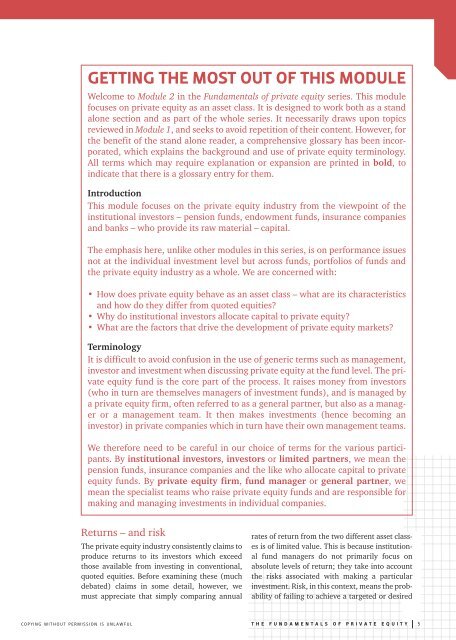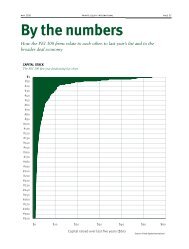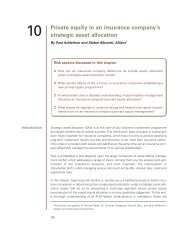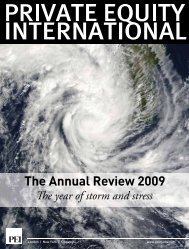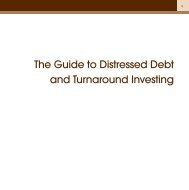Fundamentals of Private Equity and Venture Capital - PEI Media
Fundamentals of Private Equity and Venture Capital - PEI Media
Fundamentals of Private Equity and Venture Capital - PEI Media
Create successful ePaper yourself
Turn your PDF publications into a flip-book with our unique Google optimized e-Paper software.
GETTING THE MOST OUT OF THIS MODULE<br />
Welcome to Module 2 in the <strong>Fundamentals</strong> <strong>of</strong> private equity series. This module<br />
focuses on private equity as an asset class. It is designed to work both as a st<strong>and</strong><br />
alone section <strong>and</strong> as part <strong>of</strong> the whole series. It necessarily draws upon topics<br />
reviewed in Module 1, <strong>and</strong> seeks to avoid repetition <strong>of</strong> their content. However, for<br />
the benefit <strong>of</strong> the st<strong>and</strong> alone reader, a comprehensive glossary has been incorporated,<br />
which explains the background <strong>and</strong> use <strong>of</strong> private equity terminology.<br />
All terms which may require explanation or expansion are printed in bold, to<br />
indicate that there is a glossary entry for them.<br />
Introduction<br />
This module focuses on the private equity industry from the viewpoint <strong>of</strong> the<br />
institutional investors – pension funds, endowment funds, insurance companies<br />
<strong>and</strong> banks – who provide its raw material – capital.<br />
The emphasis here, unlike other modules in this series, is on performance issues<br />
not at the individual investment level but across funds, portfolios <strong>of</strong> funds <strong>and</strong><br />
the private equity industry as a whole. We are concerned with:<br />
• How does private equity behave as an asset class – what are its characteristics<br />
<strong>and</strong> how do they differ from quoted equities?<br />
• Why do institutional investors allocate capital to private equity?<br />
• What are the factors that drive the development <strong>of</strong> private equity markets?<br />
Terminology<br />
It is difficult to avoid confusion in the use <strong>of</strong> generic terms such as management,<br />
investor <strong>and</strong> investment when discussing private equity at the fund level. The private<br />
equity fund is the core part <strong>of</strong> the process. It raises money from investors<br />
(who in turn are themselves managers <strong>of</strong> investment funds), <strong>and</strong> is managed by<br />
a private equity firm, <strong>of</strong>ten referred to as a general partner, but also as a manager<br />
or a management team. It then makes investments (hence becoming an<br />
investor) in private companies which in turn have their own management teams.<br />
We therefore need to be careful in our choice <strong>of</strong> terms for the various participants.<br />
By institutional investors, investors or limited partners, we mean the<br />
pension funds, insurance companies <strong>and</strong> the like who allocate capital to private<br />
equity funds. By private equity firm, fund manager or general partner, we<br />
mean the specialist teams who raise private equity funds <strong>and</strong> are responsible for<br />
making <strong>and</strong> managing investments in individual companies.<br />
Returns – <strong>and</strong> risk<br />
The private equity industry consistently claims to<br />
produce returns to its investors which exceed<br />
those available from investing in conventional,<br />
quoted equities. Before examining these (much<br />
debated) claims in some detail, however, we<br />
must appreciate that simply comparing annual<br />
rates <strong>of</strong> return from the two different asset classes<br />
is <strong>of</strong> limited value. This is because institutional<br />
fund managers do not primarily focus on<br />
absolute levels <strong>of</strong> return; they take into account<br />
the risks associated with making a particular<br />
investment. Risk, in this context, means the probability<br />
<strong>of</strong> failing to achieve a targeted or desired<br />
COPYING WITHOUT PERMISSION IS UNLAWFUL<br />
THE FUNDAMENTALS OF PRIVATE EQUITY 5


